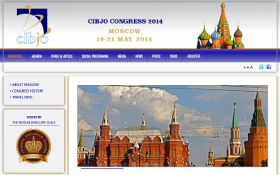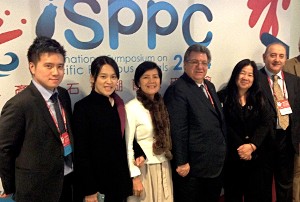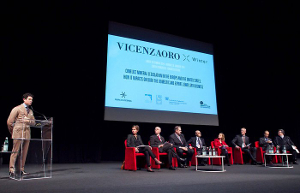About admin007
This author has not yet filled in any details.So far admin007 has created 188 blog entries.
Registration for CIBJO Congress 2014 now open via just-launched dedicated congress website
Registration for the 2014 congress of CIBJO, the World Jewelry Confederation, is now open. Delegates and other participants may register for the congress and its social programme, as well as book hotel rooms, via a dedicated congress website located at: http://congress2014.cibjo.org/.
The 2014 CIBJO Congress will take place in Moscow, Russia, May 19-21, 2014, with pre-congress meetings on May 17 and May 18. The congress will be hosted by the Russian Jewellers’ Guild, whose headquarters will also serve as the main congress venue.
The organizers have announced a change in the main congress hotel. It is now the five-star Hotel Nikol’skaya Kempinski, one of Moscow’s most prestigious establishments, which is offering especially low rates for attendees of the CIBJO congress. Located in an historic building that was constructed in 1870 by Count Alexei Orlov-Davydov, it is located in the heart of historic Moscow, within short walking distance from the Kremlin, Red Square and the Bolshoi theatre.
The congress website includes the congress program, important travel information and details about the social programme, which several tours of the Russian capital and the opportunity to attend a performance by the Bolshoi Opera. Online registration forms for the congress and social programme are available, as a link to the Hotel Nikol’skaya Kempinski’s booking service.
As the official venue for the meeting of the CIBJO Assembly of Delegates, the CIBJO Congress will gather in Moscow the members of national jewellery and gemstone associations from more than 40 countries and representatives of many of the industry’s most important commercial bodies. The congress also serves as a forum for CIBJO’s professional commissions, and is the venue at which its Diamond, Coloured Stones, Pearl, Precious Metals and Gemmological Blue Books are discussed and updated.
Coral sector must be vocal advocate for responsible environmental practices, CIBJO President tells Pacific Precious Coral Forum in Taipei
The Pacific Precious Coral Forum, which is taking place February 17-18 in the Taiwanese capital, has drawn together government officials, scientists and members of the fishing and jewellery industries from Taiwan, Japan, China, Hong Kong, Thailand, Morocco, Italy and Monaco. It is focused on the biology of precious coral and the sustainable use of resources, through academic research, management methods and fishery techniques. The forum is co-organized by the Taiwanese Fisheries Agency and Council of Agriculture, together with the Taiwan Precious Coral Association, with the support of the Taiwan Jewellery Industry Association.
“We, the jewellery industry, have experience of joining hands with civil society to show that the precious objects we produce are a force for good, and while we may create non-essential products, we are an essential industry,” Dr Cavalieri said. “People need to associate coral jewellery with good environmental management. Environmentally conscious consumers should go out of their way to purchase precious coral jewellery, and certainly not avoid it.”
A Precious Coral Working Group was created within CIBJO in 2012, and Dr Cavalieri proposed that it be elevated to the status of a full CIBJO Commission, which would be charged with creating a set of international accepted standards and nomenclature, within the framework of a new CIBJO Blue Book. The president of the Precious Coral Working Group, Enzo Liverino, also participated in the forum.
“The harmonisation of industry standards is key component of CIBJO’s mission,” Dr Cavalieri stated. “This always has been an important factor, but it has become even more so as the world economy has globalized, and international trade has become the dominant component of our business. Quite simply, what is understood in one country or market needs to be understood perfectly in others.”
“Clear, reasonable and internationally accepted standards need to be established that will decide what treatments and enhancements must be disclosed each time a gem changes hands. Furthermore, the method of disclosure needs to be decided so that it will means the same thing in Asia, as it means in Europe, the Americas and Africa,” the CIBJO President continued.
“The creation of such system would ideally be done by a committee of industry experts, and from our perspective the right forum would be a Precious Coral Commission working within the CIBJO framework. It would be able to make decisions that receive automatic international acceptance,” Dr Cavalieri said.
The CIBJO’s president’s proposal was received warmly by attendees at the Pacific Precious Coral Forum, and was supported by Ming-Li Hung, President of the Taiwan Jewellery Industry Association, who agreed to seek full membership as a national association in CIBJO, and work toward the establishment of the CIBJO Precious Coral Commission at the upcoming CIBJO Congress in Moscow, which will take place May 19-21, 2014.
Photo caption 1: CIBJO President Gaetano Cavalieri addressing the Pacific Precious Coral Forum in Taiwan.
Photo caption 2: Photographed during a pause in the proceedings at the Pacific Precious Coral Forum (from left): George Lu ; Janice Lu; Pornasawat Watanakul, Vice President of CIBJO’s Gemmological Commission; Gaetano Cavalieri, CIBJO President; Ming-Li Hung, President of the Taiwan Jewellery Industry Association; and Enzo Liverino, President of CIBJO’s Precious Coral Working Group.
Seminar in Vicenza examines the intricacies and challenges created by conflict minerals legislation in the United States and Europe
A blue-ribbon panel of experts has discussed what may be a gathering storm for the gold jewellery industry, brought upon by legislative processes targeting minerals from conflict areas in the Great Lakes region of Africa. They were participating in a seminar at the VICENZAORO Winter trade fair, entitled “Conflict mineral legislation in the Europe and the United States: How it impacts upon both the domestic and export jewellery business.” It was hosted by Fiera di Vicenza; CIBJO, the World Jewellery Confederation; the Responsible Jewellery Council; and Confindustria Federorafi.
Presented by Corrado Facco; Managing Director of Fiera di Vicenza, and Gaetano Cavalieri, President of CIBJO, the seminar panelists included Marieke van der Mijn, Standards Coordinator at the Responsible Jewellery Council; Michael Allchin, Chief Executive and Assay Master at the Birmingham Assay Office and the President of the CIBJO Precious Metals Commission; Philip Olden, who is responsible for managing the development and implementation of responsible sourcing protocols for gold at Signet, the world’s largest specialty jewellery retailer; Marco Falezza, Jewellery Operations Director of Gucci Group, who represented Confindustria Federorafi; and Maria Benedetta Francesconi of the Italian Ministry of Economic Development. The moderator was Simon Brooke, a British journalist.
The first of the two specific pieces of legislation under the spotlight was Section 1502 of Dodd-Frank Act in the United States. Signed into law in 2010, it is a disclosure requirement that requires publicly traded companies to determine whether their products contain conflict minerals and conduct inquiries into country of origin of those minerals. Starting, this year, they need to make formal disclosures to the Securities and Exchange Commission (SEC).
Similar legislation is pending in the European Union. In Brussels, the European Commission’s Directorate-General for Trade is currently putting the final touches to a legislative proposal on conflict minerals that may parallel Dodd-Frank, though it intends to build on international initiatives like the OECD Due Diligence Guidance.
“What this means is that quite a significant percentage of the jewellery traded in the United States will end up in the display cases of publicly traded companies, who according to Dodd-Frank need to monitor their supply chain. In other words, if you export or are looking to export to the United States, it is more than likely that, ultimately, Dodd-Frank will matter to you,” noted Corrado Facco, in his opening address to the seminar.
The pervasiveness of Dodd-Frank was confirmed by Philip Olden, who noted that as a publicly traded company, Signet is obliged to ensure that any company from which it buys jewellery containing gold has itself introduced a due diligence system by which it can accurately trace the source of the gold, preferably to the refinery. Signet, he noted, has developed a detailed set of protocols with which its suppliers are obliged to comply. “If you are not able to demonstrate that you can meet legal requirements of these protocols, U.S.-listed companies may not be able to buy from you,” he said.
The critical juncture for due diligence in the supply chain is the gold refineries, said Marieke van der Mijn. She noted that RJC has been working collaboratively to institute an internationally acceptable due diligence system that demonstrates that the refined gold they produce is conflict-free. She also disputed the notion that supply chain assurance was a luxury available only to only larger companies, noting that 40 percent of RJC’s members are small and medium-sized enterprises.
While having been consulted by both the British government and the European Union during the process of developing a EU conflict minerals legislation, Michael Allchin still questioned whether a legislative initiative was justified, and whether voluntary systems being adopted by industry, like the OECD Due Diligence Guidance, would be more efficient. “The truth is that easiest route to compliance today is not to buy gold from Africa’s Great Lakes region, but the damage that is being done to local communities, many of which do not have alternative means of a livelihood, is devastating and often counterproductive,” he stated.
In its efforts to ensure that its supply chain remains free of conflict minerals, Gucci took a somewhat different approach to companies like Signet, recounted Marco Falezza. Instead of requiring that its clients demonstrate that they had shown due diligence in ensuring the origin of the gold, Gucci acquired the gold itself, after examining the sources of the material, and then provided the materials to those companies that produce jewellery for it.
Speaking on behalf of the Italian government, Maria Benedetta Francesconi addressed the difficulties faced by the small and medium sized enterprises that make up the bulk of the local jewellery sector. There are real cost factors involved, she stated, and the task of verifying the movement of gold through the pipeline is certainly not a simple one.
“My concern, which is one that I feel strongly needs to be addressed, is that by placing another substantial burden upon the industry we are again raising the bar of entry. We have to develop systems by which all participants in this industry are reasonably able to meet the requirements of due diligence. It is already difficult enough for young entrepreneurs to gain a foothold in the business. We do not want to create artificial obstacles that are too high to climb, or prevent less established companies from gaining entry into certain markets or market sectors.”
“Above all we need to consider the commitment we have as members of a responsible business community to society,” stated Gaetano Cavalieri, in an address that concluded the seminar. “If the end result of conflict minerals legislation is that, as a rule of thumb, companies avoid trading with the central African gold producers because it is the easiest way to achieve compliance, then we may have avoided doing the wrong thing, but we certainly did not do the right thing.”
The seminar was opened by Fiera di Vicenza’s new president Matteo Marzotto, who noted his organisation commitment to serving both the Italian and international jewellery sectors.
Photo caption: Matteo Marzotto, President of Fiera di Vicenza, welcoming participants to the conflict minerals seminar in Vicenza.




